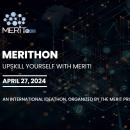The MERIT Project’s Approach to Short-Term Courses
The Journey So Far: A Focus on Key Technological Domains
In the rapidly evolving digital landscape, the need for advanced digital skills is more pressing than ever. Recognizing this, the MERIT project has been at the forefront of offering specialized online courses designed to equip individuals with the essential knowledge and skills in key areas of technology. These courses, carefully curated and delivered in English, have served as a gateway for learners to dive into the complex yet fascinating world of Artificial Intelligence (AI), Business Analytics, and the Ethical, Legal, and Human Aspects of AI and Cybersecurity.

The MERIT project’s short-term courses, such as "Fundamentals of AI," "Business Analytics," and "Ethical, Legal and Human Aspects of AI and Cybersecurity," have garnered significant attention from a diverse group of learners. In total 150 enrollments to those 3 courses were done. These courses, which provided up to 3 ECTS credits, were designed to be accessible and engaging, allowing participants to balance their learning with other professional or personal commitments. Although not intensive, these courses offered a comprehensive introduction to critical areas, ensuring that participants could build a solid foundation in each subject.
Expanding Horizons: Short-Term Courses for Specific Region
While the initial courses were successful, feedback and observations from the project highlighted a growing need to cater to a broader audience, particularly in non-English-speaking regions. In response to this, MERIT has introduced a new short-term course “Fundamentals of AI”, taught in Lithuanian, that offers 6 ECTS credits and will be started on the 4th of September, 2024. This course marks a significant shift in the project’s approach, reflecting the importance of presenting advanced digital skills in the local language to increase accessibility and engagement among native Lithuanian speakers. Additional courses in Lithuanian are planed later this academic year. All of them dedicated to upskill in artificial intelligence and its management.
The decision to offer a course in Lithuanian aligns with the broader objective of fostering advanced digital skill increase within the local context. By doing so, the MERIT project not only meets the needs of a wider audience but also strengthens the connection between advanced digital skills and the local culture. This course is expected to resonate particularly well with professionals, students, and individuals who prefer or require instruction in their native language. As well the courses will be provided in-person, which will give lead to higher study experience, hands-on activities and individual consultation.
What Other Courses Are Needed?
 As digital technologies continue to advance, the demand for a broader range of skills and knowledge will only increase. The future of the MERIT project could involve the development of additional courses that cater to emerging needs in society. While MERIT project master study programs cover not only Artificial Intelligence, but Cybersecurity and Internet of Things areas, we are at the crossroads – what courses are on the demand in the general society, not only master level students.
As digital technologies continue to advance, the demand for a broader range of skills and knowledge will only increase. The future of the MERIT project could involve the development of additional courses that cater to emerging needs in society. While MERIT project master study programs cover not only Artificial Intelligence, but Cybersecurity and Internet of Things areas, we are at the crossroads – what courses are on the demand in the general society, not only master level students.
The MERIT project’s short-term courses have laid a solid foundation for edification of advanced digital skills. As society’s needs continue to evolve, the MERIT project has the opportunity to expand its offerings, ensuring that learners are well-equipped to navigate the complexities of the digital world. By staying attuned to the interests and demands of society, the project can continue to provide valuable and relevant educational experiences that empower individuals to thrive in the digital age. Everyone is free to express their interest in some areas of advanced digital skills. This would help us to draw a clear path on the future proposal of short-term courses to upskill the society.




